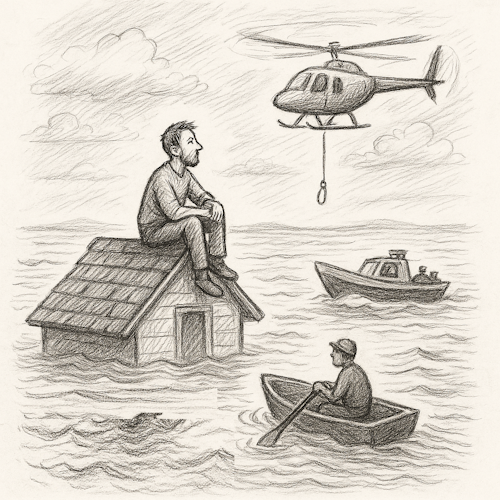The Drowning Man & The Helicopter
Illustrates Ignoring Feedback, Misunderstanding Help, Misaligned Expectations
Agile transformations are full of people waiting for something bigger to “save” them. Teams hold out for better tools, stronger leaders, or that next framework rollout. But help often arrives in smaller, less obvious forms. Coaches must help people recognize and act on the help already available.

A terrible flood strikes a small town. A man climbs to the roof of his house as the water rises around him. He prays, “God, please save me.”
A neighbor comes by in a rowboat and says, “Get in!”
“No thanks,” says the man. “God will save me.”
Later, the police arrive in a motorboat.
“Come on, get in,” they shout.
“No,” the man replies. “God will save me.”
As the flood reaches the roof, a helicopter hovers above and lowers a rope.
“Grab the rope!” the rescuer calls.
The man waves it off. “God will save me!”
Eventually, the waters rise too high, and the man drowns.
In the afterlife, he confronts God. “Why didn't you save me?”
God replies, “I sent a rowboat. I sent a motorboat. I sent a helicopter. What more did you want?”
Lessons Learned
Solutions May Look Different Than Expected
Agile teams often miss available help because it doesn't match their mental image of a solution. They expect perfect clarity, ideal timing, or official approval. But support often comes in imperfect, practical forms.
Waiting for Rescue Can Lead to Stagnation
Hoping for a savior delays action. Teams that wait for a leader to “fix things” miss opportunities to inspect, adapt, and move forward with what they already have.
Action Beats Belief Alone
Faith in a better future or a perfect plan is not enough. Progress happens when teams take initiative and act, even if the tools or conditions are not ideal.
Misalignment of Expectations Is a Silent Risk
Just like the man expected divine intervention in a dramatic form, organizations often expect Agile to “feel” revolutionary. But Agile success usually comes quietly, through habit, feedback, and improvement.
The System Already Offers Clues
In complex systems, signals and interventions are always present. Like the rowboat or the helicopter, systems often nudge us toward adaptation. Teams need to pay attention and respond to those signals rather than ignore them.
Coaching Tips
- Use this Parable to Challenge Passive Mindsets: Teams waiting for executive sponsorship or the next tool rollout can benefit from this story. Ask, “What rowboats have we already ignored?”
- Introduce it During Transformation Slowdowns: If people are feeling stuck or blaming others, this story can help reframe ownership.
- Map current challenges to "boats" and "helicopters": In Retrospectives, identify what help is available but unused: process changes, feedback loops, coaching, small experiments.
The drowning man didn't lack opportunity. He lacked awareness and willingness to act. Agile success is not about waiting for the perfect solution. It's about recognizing the imperfect help already around us and responding with intention.
If your team is feeling overwhelmed or waiting for things to get better, ask: What if the rescue already came, and we just didn't recognize it?


